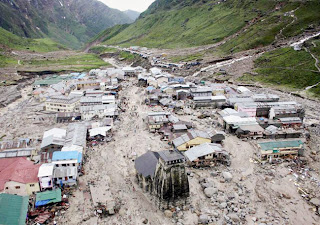'Give us what you've got' to 'This is what we need'
'Give us what you've got' to
'This is what we need'
According
to a news report Kedarnath
shrine was virtually submerged in mud and floods that claimed over 130
lives in Uttarkhand and Himachal Pradesh and left over 70,000 pilgrims for
Himalayan shrines stranded. The shrine of Shiva, visited by Hindu pilgrims from
across the world, however, was only partly damaged amid the death and
destruction flash floods, cloudbursts and landslides caused in various parts of
Uttarakhand for the third consecutive day on Tuesday. River water levels are
continuing to rise across the state, clogging roads and leaving hundreds of
pilgrims stranded on their way to visit shrines. The state government was also
readying food parcels and drinking water to be dropped by helicopters to remote
villages cut-off by the torrential rains.
The
Prime Minister, Dr. Manmohan Singh, spoke to the Chief Minister of Uttarakhand
earlier this evening and inquired about the flood situation in the state. The
Prime Minister assured the Chief Minister of Uttarakhand of all assistance in
rescue and relief operations in the flood hit state.
As
per UN International Strategy for Disaster Reduction (UNISDR), since the 1980s,
the risk of economic loss due to floods in Organisation for Economic
Cooperation and Development countries has increased by more than 160 percent,
outstripping the growth of GDP per capita. "What we need from them is not
only corporate social responsibility and money, but their active involvement.
It can be as simple as building a dyke around their factories, choosing the
right locations to build factories and coming up with disaster contingency
plans." There are only two options, either reduce the speed of
development or invest more in flood control."
"Many
of these countries now see disaster management as a priority. There has been a
change from the government saying, 'Give us what you've got' to 'This is what
we need'. Asia is the most disaster-prone region in the world; in 2010,
disasters affected more than 200 million people. In global terms, 89 percent of
all people affected by emergencies live in Asia. But coordinating the
increasing capacities of nations to respond to their own crises and those of
others remains largely unchartered territory for regional groups.#Disaster #DisasterManagement #Priority #People #Asia #Global #Government #Asia #UNIDSR





Comments
Post a Comment